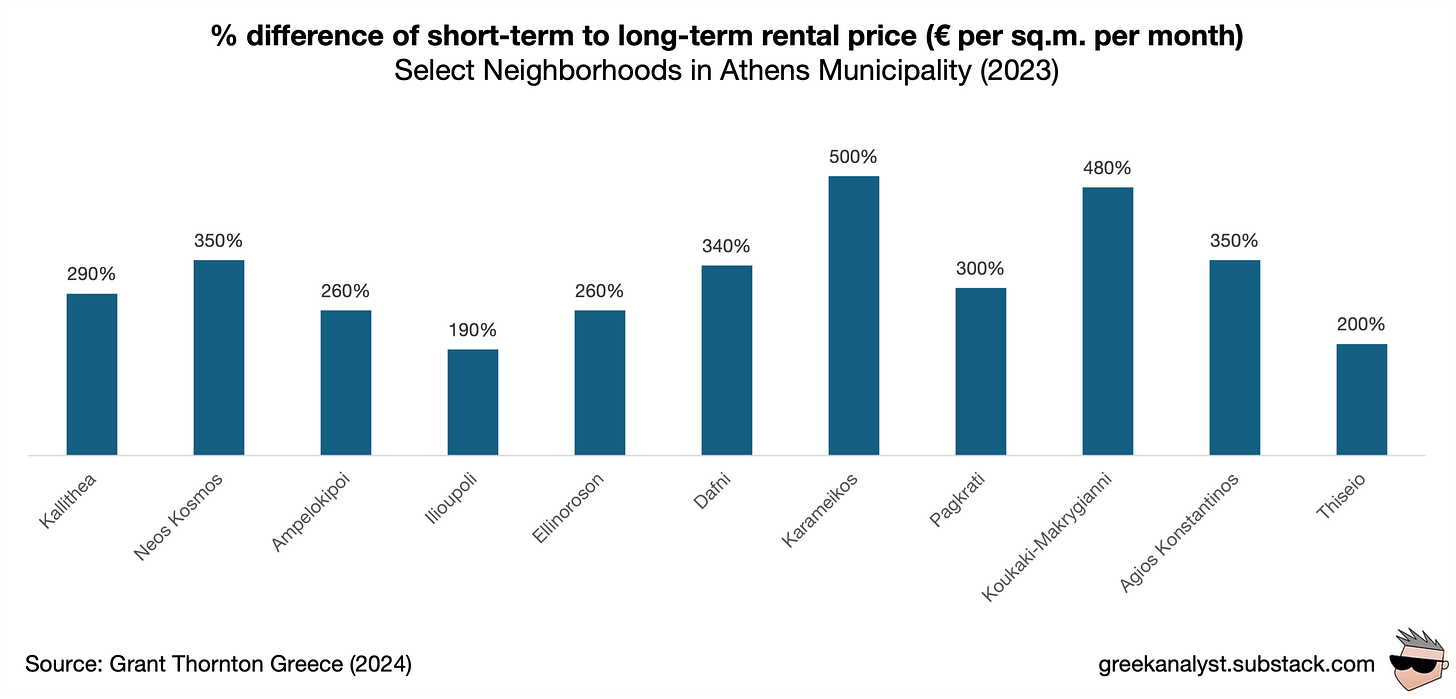The newsletter has just hit 3,000 subscribers! Thanks everyone for reading and supporting this small effort of Changing Greece through the years. Please enjoy this long-read, one of many to follow over the coming months.
🏢 The Airbnbification of Athens
Let’s start with a riddle.
What’s something small, seemingly innocuous, added by new buildings every day, usually found in large numbers, and makes an increasing number of people angry?

Answer: The short-term rental lockbox.
But why does such a small thing make so many people angry?
If you have walked around the city of Athens in the past few years, you certainly have seen graffiti like this (pictured below) tagged over some poor wall.
Sidestepping the anarchist vibes and vandalism for a moment, there is a very valid concern expressed in many of these wall tags: access to affordable housing for locals.
Airbnb-style rentals are not inherently good or bad.
They can be an economic blessing for tourism-prone regions, especially for people lucky enough to have secondary properties to let for some extra income.
But they can also become a socio-economic nightmare for people priced out of their old neighborhoods or anyone having to live with loud tourists barging in and out of their building every day.
The problem is not the existence of Airbnb or similar services per se.
Allowing people to make some extra cash with a spare room should be welcomed. Short term rentals also offer more choices and create healthy competition against hotels, especially in popular travel destinations.
The real issue is when mass tourism obliterates the minimum acceptable requirements for a viable urban life.
This is why we need to create and enforce an optimal framework of rules around some of its key enablers, including Airbnb and its short-term rental siblings.
The Athenian housing crisis in context
Like many other large cities in the world, Athens is facing a severe housing crisis.
The proliferation of short-term rentals is not the only reason Athens is experiencing this problem. However, they play a key part in the equation.
According to the OECD, house prices in Greece have increased by 69% between 2017 and Q2 2024 and have risen much faster than incomes and rents.

Large cities like Athens are especially susceptible to this.
The fast increase in housing prices is concentrated in the largest cities and is in part due to the increasing share of non-resident buyers in the Greek real estate market, notably in the Attica region that includes the Athens metropolitan region and in tourists areas. (OECD)
In the wider Attica region, there are only 255k vacant houses and of these, only 152k are available for rent or sale. That’s a pretty low number for the capital of Greece.
If we look at the average monthly rent across top European cities, we see that Athens places at the lower mid level of the distribution.

But price tells us only half the story. The other half comes from cost of living. Only if we combine the two can we have a better sense of the full picture.
Greeks face the highest housing costs in Europe — north of 35% — as a percentage of their total disposable income, on average.
This is exceptionally high.
Let’s also look at the housing cost overburden rate, which measures the percentage of population living in households with total housing costs (net of housing allowances) representing more than 40 % of disposable income (net of housing allowances).
31% of Greeks living in a city like Athens had housing costs over 40% their income. The average was just 10.6% for other EU cities.
Greece, again, comes at the very top of this very negative ranking.
Thessaloniki, Patras and other large towns face similar pressures. Athens, however, experiences the most visceral stress of them all.
Rage Against The Airbnb Machine
Athens is not the only global travel destination struggling to balance between catering to increasing waves of tourists and the negative effects of mass tourism.
I’ve talked before about the importance of social cohesion and the cautionary tale that Barcelona presents from its own experience with short-term rentals.
But it’s not just Barcelona. Many major tourist cities around the world — including Paris, Madrid, Lisbon, Berlin, Rome, Florence and Vienna — are facing the same problems, with citizens protesting regularly and regulators imposing increasingly stricter rules on Airbnb-style properties.
In the past two years alone, we have seen important policy changes across Europe:
Italy is scrapping self check-in for short-term stays, effectively banning Airbnb key boxes, which have become an international symbol of mass tourism.
Spain is contemplating a 100% tax on non-EU residents who buy property in Spain but don’t live in it. It’s also ending its own Golden Visa program in April.
Portugal restructured their Golden Visa program and stopped allowing foreign property buyers to qualify for it.
Ireland has scrapped its Golden Visa program altogether in 2023.
Greece increased the minimum investment limits (for properties in certain areas) to its Golden Visa program last year, introduced incentives to turn short-term rentals into long-term ones, just passed new measures that create a better regulatory framework around short-term listings and enacted a one-year ban on registering new apartments for short-term rentals in certain areas of Athens.
The effects of these changes are yet to be determined, but what is clear is that policymakers are becoming increasingly more active in regulating this space.
Lack of affordable housing has become a large and pressing issue for the entire EU.
Not surprisingly, the European Commission has started thinking about directing some of the EU’s massive €392 billion cohesion fund toward affordable housing policies across its Member States.
Would throwing a ton of money at the problem solve it? I doubt it. The root causes run much deeper and demand more drastic changes. But that could be a start.
A deep-dive into the Athens Airbnb landscape
Let us now focus on the case of Athens.
Here is how the map of Airbnb-registered properties in central Athens looks like.

Red dots (🔴) represent entire Airbnb homes or apartments, while green dots (🟢) represent Airbnb-offered private rooms.
Looks pretty dense, right?
As of December 2024, there were more than 14,642 total Airbnb listings in central Athens alone.
But that is not the most interesting part…
What’s even more astonishing is the listings per host metric.

More than 70% of all listings in central Athens are multi-listings.
What that means is that they are hosted by Airbnb hosts with two or more listings.
In Paris, that number is 32.0%. In Berlin 39.7%. In Rome 59.1%. In Madrid 65.0%.
In Lisbon and Barcelona — two cities engulfed in deep affordable housing crises, much like Athens — the numbers are 73.4% and 74.6%, respectively.
But the interesting part does not end there.
Let’s look at the extremes of the Airbnb listing distribution in central Athens.
There are only 4,333 listings each belonging to single hosts (just 1 listing each), yet 4,960 listings belong to hosts with 10+ listings each.
Whether it is solo-rentiers, management agencies or renting companies, there is an entire industry with a large business apparatus operating in the background.
Here are the 12 top hosts by numbers of listings in their portfolios.

The 12th top host has 58 listings connected to their name, while the 1st top host has 125 listings — more than twice as many.
If that’s not crazy, well I don’t know what is.
The broader short-term rental industry in Athens
Greece achieved a significant milestone in short-term rentals during 2024.
More than 230,000 short-term properties, corresponding to over 1 million available beds, were offered nationwide in August of last year.
If we look at the broader Attica region, we see that short-term properties available for rent increased on average by 29% from 2019 to 2024.
Attica currently dominates in terms of short-term overnight stays, with top summer destinations like Crete, the Cyclades and the Ioanian Islands following behind.
If we narrow our focus in the city of Athens, we see that the number of available short-term rental beds has increased drastically — more than doubling in 5 years.
A metric particularly relevant to note is the price premium of short-term rentals.
Short-term rentals command an average price (euro per square feet per month) that is significantly higher than long-term rentals.
What this means is that many apartment/house owners have a very lucrative incentive to be letting their properties short-term, instead of long-term.
Of course, there are many reasons why someone would still prefer to let their property long-term (e.g. steady income, not having to pay for bills, zero management costs).
But understanding the price premium short-term letting provides is important to grasp why this trend is not expected to reverse (on its own) anytime soon.
Where does this leave us?
Well, we are left in a tricky situation.
Allow me to explain.
From high/off season to all-season tourism
Greece is now not just popular during the summer. It is becoming increasingly more popular during off-season months too.
Between September and November of 2024, Airbnb demand in Greece increased more than 20% year-over-year. Last Christmas season also so an impressive jump in activity, especially in Athens.
We are moving away from a high/off season tourism model to an all-season one.
Existing trends and pressures are only going to exacerbate, especially since the country has been doing little to shift from its tourism-based engine of growth into more productive industries.
Pushing for better regulation
Governmental and regulatory pressure towards platforms like Airbnb works.
Back in 2017, Airbnb had refused to share the tax details of property owners on its platform with the Greek state.
Eight years later, and thanks to EU regulation (which sometimes does get unfairly vilified), platforms like Airbnb are required to collect and report taxpayer information on EU-based users who earn income on their platforms. Tax evasion is less easy today.
Thankfully, the Greek government is pushing for a series of more targeted measures. We talked about some of them earlier in this piece. These are steps towards the right direction. However, even with these, short-term rentals continue to grow consistently.
On the negative side, watering down legislation or providing continuous ‘transitional’ grace periods is not the way to go. On the positive side, it seems that the wider political establishment is keen on working on this issue across party lines.
Moving forward from here
Greek short-term rental professionals are already finding ways to pre-empt new regulations or manoeuvre around them. Luckily, audits for unregistered short-term lettings by the Greek tax authorities are happening more frequently today.
The goal here should not be to punish or wipe out this industry. Rather, it should be to create a better framework for it to run and closely monitoring adherence to it.
In a global first, Greek Airbnb letters are going on strike on February, reacting to the new changes brought by the government. Their concerns should also be heard.
Balancing the needs of a flourishing short-term rental economy with the needs of affordable housing and a respectable way of living is definitely not easy.
At the end of the day, the pendulum will always swing one way or another, even after a period of stasis. Movement is the only constant.
The pendulum’s direction should always depend on a very simple question:
What kind of life do we envision building in our cities?
I want to live in a city that is habitable for its citizens, an Athens that I am proud of.
What’s your answer?
If you enjoyed today’s newsletter, please let me know with a like or reply. Thanks!











Great article. I'm colour blind (achromatopsia is such a cool word, btw) so the density map was a challenge but I get it. I go to Athens probably once/ twice a year and I've noticed the key boxes. It's good revenue for some locals but inflationary for everyone :-(
Very good article.
I think the core of the problem is not airbnb per se ( it is, but it isn’t ). The core problem is how concentrated Greece is in Athens. Much like London is the whole of England, economically and … well in every way.
Greece should aim to spread in other cities, and give them more “power” to attract companies and investment. It will help spread the costs as well. Much like Germany where no one city is the center of everything. Countries that have one or two big cities monopolising everything ( Barcelona, Lisbon, Rome, Paris, London ) have this issue in those cities.
I do not know if genuine efforts like that are underway, I hope there are.